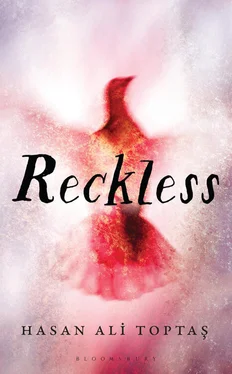In the morning a tiny slip of a sergeant took them down to the mess hall on the ground floor, and then, walking faster than the wind, he led them over to the main building. He did not tell them to line up when they got there. Instead he stared at them, as if he had some very bad news that he could not bring himself to put into words. Then he pulled himself together, as if in response to a secret sign, passed a hand over his face, and in a thin little voice, he said, ‘My friends, you are going to spend the next few days here putting up a building.’ With that he led them off to the construction site next door. The site was swarming with soldiers. Some were digging inside a huge pit several dönüms in area. Some were carrying metal rods that were five or six metres long. Some were tying metal rods together with wire, and others were carrying stones from behind the hill in single file. But the ones carrying the stones were different from the others; most of them had hair growing down to their beards, and they seemed old enough to be addressed as big brothers or uncles. Their uniforms were in poor condition. Some were ripped at the knees and elbows, some were missing buttons, some were so short you could see their calves. And on top of all that, the soldiers looked bewildered, as if they didn’t know where they were.
‘Our friends over there are convicts,’ the sergeant said, lowering his voice.
With that, he turned to face his men. He stared at them as if they weren’t standing right next to them, but very far away.
‘And now you are going to go and carry stones with them,’ he said. ‘Off you go. Get started!’
They lined up like the convicts and followed them behind the hill. Here there was a red pit, where a group of muscle-bound convicts was holding pickaxes, hacking up rocks, while another group of convicts crushed these rocks with a huge sledgehammer, and there was so much sweat running down their faces that you’d think that an invisible hand was looming over them, pouring water from a pitcher. During their few trips between this quarry and the pit that was to serve as the new building’s foundation, they kept themselves separate from the convicts, but soon they began to mingle. Once they had begun to mingle, the convicts began to talk now and again. And that was when they heard how these men had come to be in prison, and what horrors they had seen while serving on the border. And at the end of each story, they thanked God for still being alive, and said how good it was to be in prison. And so they listened to these tales of dark nights made darker by explosions and the hiss of gunfire, and whinnying horses, and bloodcurdling cries, and herds of sheep, and bloodied tea crates lying next to people and animals who had been blown to bits, and the more they heard, the more frightened these Silvan boys became, of course. They became so frightened, in fact, that they said nothing all day long. They just looked at each other strangely, from the corners of their eyes.
The next day a big-boned, white-haired convict who called himself Dede took it upon himself to give them some advice. Gathering them together during a meal break, he sat down, put his hands on his knees and let his fingers droop. Assuming a fatherly tone, he said, ‘So tell me. Did they beat you a lot during training?’ They all answered at once. They’d all had enough beatings to fill a truck, they said. To which this man who called himself Dede said, ‘Well from now on, it won’t be the commanders who’ll be giving you your worst beatings. It will be the conditions. This is one thing you should never forget.’ And he smiled bitterly as he shook his head.
For a time he was silent. He looked down at the ground and swallowed.
And then he said, ‘Now listen carefully to what I have to say. Most likely they’ll be dispatching you to your companies tomorrow. What I mean is, some of you will be going to Akçakale, and some to Viranşehir. Wherever they send you, you are fated to end up in the middle of hell, by which I mean one of those outposts along the border. So my advice to you while all this is going on is to do whatever you can to stay in the place where they’re sending you. For example, every once in a while they ask you questions. Are any of you tailors? Is anyone here a barber? And who here has worked in construction? So if you happen to have any talent whatsoever, or if you happen to be good at something, even just a little, for God’s sake, don’t be shy. Step right out with a confident look on your face and say, “Yes, I can do that.” Or say, “Yes, that was the work I did when I was a civilian.” To make a long story short, my advice to you is this: whatever you can do to stay with your company or your battalion, do it.’
‘And what if we don’t manage to stay with our company or battalion?’ asked Kenan.
Dede looked at Kenan sharply through his dusty eyelashes and then bowed his head.
‘You’re already in the shit,’ he said. ‘Once you go out there, you’ve really had it.’
His words plunged them into silence. And then they got up to return, bewildered, to their work, of course. With long faces they picked up more stones, and carried them out in single file.
Two days later the waif-like sergeant rushed over. ‘Put down your stones! Put down your stones!’ he said to the boys from Silvan. And he took them to the front of the main building. This time he ordered them to line up two by two, and there they waited motionless in the sun for twenty-five, thirty minutes. Finally a grim and fleshy sergeant major came outside; standing on the steps, he produced a piece of paper, and in a voice that sounded as if he had swallowed a microphone, he boomed, ‘Now listen to me carefully. I am going to read out the names of those who are to be sent to Suruç Company. You should step out of line if you hear your name and wait over there’. This sergeant major went on to read out the names of those to be sent to Akçakale and Viranşehir. When he had finished reading out the names, he rolled up the paper, and after giving his thigh a few nervous slaps, he said, ‘If you get a move on, you can make it to your companies by evening, so get going, now.’ With that, he hurried back into the building.
They piled out of the gendarmerie in confusion, and after asking anyone they met for directions to the bus station, they set off for the city centre. Once they were there, they plunged into the crowd, and here they were obliged to divide up into three groups. And each group went off in a different direction, to wander amongst the buses and minibuses on the bays. Kenan and Ziya and a few of their friends headed first for the Viranşehir minibus. After the driver dozing at the wheel had told them what time he’d be leaving, they went together to the coffeehouse at the other end of the station, where they sat themselves down on its low straw chairs and drank a glass of tea each.
‘For a moment there, I was afraid they’d send us to different companies,’ said Kenan. ‘I’m glad we’ve both ended up with Viranşehir.’
Ziya gave him a little nod. He tried to accompany it with a smile, but he just couldn’t manage it. He fixed his eyes on the tea glass before him and for a while he stayed very still, while he thought about the convicts’ terrifying stories.
‘We’ve landed in the same place, but our future is dark,’ he said, as he pushed his tea glass aside with the back of his hand. ‘God only knows what we can do.’
Kenan said nothing. He stared fearfully into the tea glass in his cupped hands.
Then they jumped up, fearing that they might have missed the bus. They rushed past the prayer-bead vendors and the rainbows they sent clicking around them. They wended their way amongst the sucuk vendors and lahmacun vendors, and through the clouds of sweat and smoke until they had reached the clapped-out minibus that would be taking them to Viranşehir. The other passengers had not yet arrived, and the driver was no longer at the wheel. There were patches of putty on the sides of the minibus. It looked like it had been sitting there, inert, for many thousands of years. Not knowing what else to do, Kenan and Ziya went to wait in the shade of a wall. Neither wanted to speak. They just stood there grimly, thinking about the stories the convicts had told them. They could still hear all the horrors that had echoes through the darkness of those stories: the bloodcurdling cries cutting through the hiss of gunfire, the whinnying horses, rearing up on their hind legs, and explosions. And each time they did so, the two men would cast their eyes to the ground in silence, and take a deep breath.
Читать дальше












